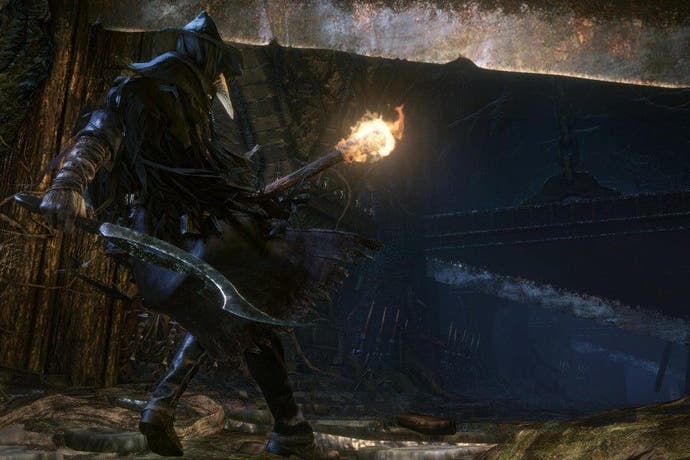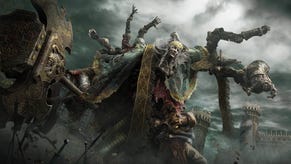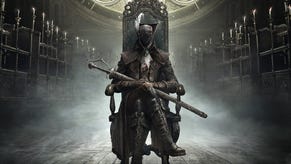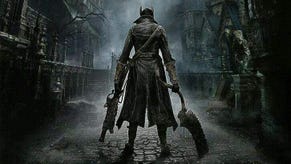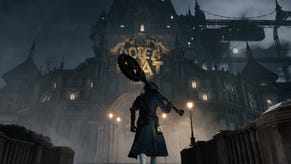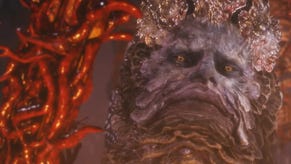Bloodborne: The Old Hunters review
The one reborn.
Editor's note: This review goes into some small spoiler territory with the identity of bosses and details on locations in The Old Hunters - so if you want go into From Software's expansion with fresh eyes, be warned.
To fire up the PS4 and feed in that Bloodborne disc one more time is a treat. Gamers have been left so bruised and battered by the industry's total embrace of DLC that we sometimes forget about the good side: an unexpected addition to a masterpiece, rather than a bloodsucking season pass. The Old Hunters is an expansion for From Software's Bloodborne and, like Artorias of the Abyss for Dark Souls, adds to a wonderful whole - without taking anything away.
The Old Hunters is set in 'The Hunter's Nightmare,' a self-contained universe where blood-crazed hunters wage perpetual war on a never-ending flow of beasts. But first you have to get there. One of the most unusual aspects of Miyazaki's approach to DLC is that it slots into the pre-existing game world rather than as a separate menu option - though luckily the requirements here aren't quite as strict as in Dark Souls (you can find out a little more about how to gain access here.) This principle hints at the broader aim with The Old Hunters. This is a meaty, detailed, crimson-soaked chunk of endgame Bloodborne, designed to give experienced hunters palpitations and freshly shock the returning troops. It does not condescend to your abilities for a second.
From the off you're facing blood-crazed hunters armed with a variety of trick weapons (all of which you can acquire), which leads to a new taste in Bloodborne's world. In the DLC's initial stages there are a mix of beasts and old hunters, which as natural enemies will go for one another. This game's AI is dedicated to PvE combat, so NPC fights can seem a little wooden, but being able to wade into a crowd in the knowledge you're not the only target is a new and welcome flavour. It's not over-used, either, but a unique feature of the opening area that is soon left behind.
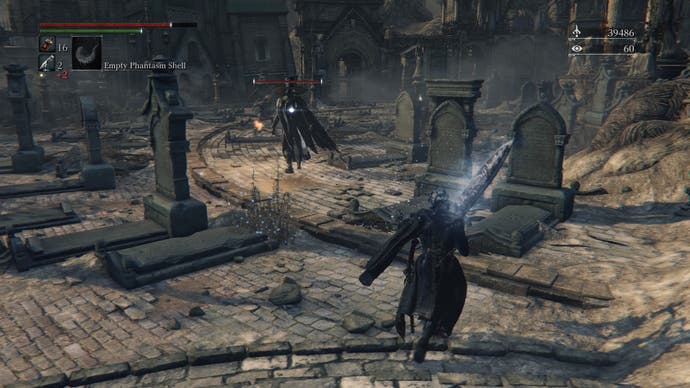
This willingness to throw out an idea, base a few sections around it, and then move on is what makes The Old Hunters such a rich addition to Bloodborne. There's something of this in the world design too: these games are known for their exceptionally-engineered location design, the kind of architecture that wraps around and leads back to itself. The setting of a nightmare allows this principle to be telescoped, so The Old Hunters is like a world in a bottle - each location's various areas are themed and lead into the next, but the transitions are frequent and bold.
The opening area is full of frenzied hunters and partially-transformed beasts, with Yharnamesque architecture overgrown and bulging at the edges from some unseen pressure. From Software's environment artists are magnificent at managing perspective - not just in the simple sense of sightlines and landmarks, but in actively curving the angles and shapes of this place to feed into your eye. The ground is not hostile, to to speak, but is constantly encroaching on your path - it's why the great break-out moments, when you run into the open and get a great view of what's ahead, have such impact.
The most memorable part of this location is the river of blood, a cliché that is usually best left to the imagination. But this is less a river than a foetid, strangled stream that pools and coagulates in corners, where fat abominations sit and slurp. Crimson smears up the banks, cakes at the edges of stairwells, and lightly splashes as you walk through it. Cainhurst's spider-women, their stomachs swollen into blood sacs, sit in little clutches lapping away. You can almost smell the copper, feel how sticky your boots are.
The river and this section ends with a boss widely-trailed at preview stage, the beast form of the old hunter Ludwig. Ludwig's gear is in the original Bloodborne, and we know him as the founder of the Healing Church's hunter faction - he is one of those almost-heroic figures Miyazaki is so good at, a noble figure corrupted by his choices. And Ludwig's boss fight is an absolute masterpiece in a game that excels at boss fights.
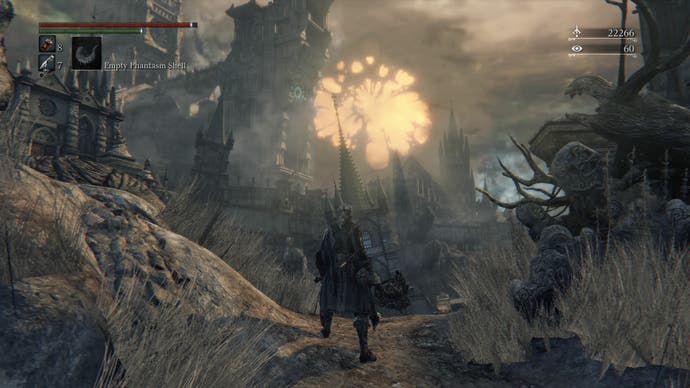
It is needless to say an extreme challenge, even by From Software's exalted standards, though my perspective may be slightly coloured by playing the DLC on NG+ difficulty. Ludwig's upper limbs slash left and right, he charges bodily forwards, and his torso-limbs strike out to catch poorly-timed dodges. The first few times I entered that room, he pancaked me in record time.
As any fan of these games knows, the real Bloodborne starts here. You begin learning Ludwig's attacks and movements slowly, figuring out when you're safe to get a hit in, and inch-by-inch chewing away more of his health bar on each go. And of course dying many, many times. This process of mastery is slow, full of bumps, and not without frustration at times - but the satisfaction achieved through it is indescribable.
One of the reasons it matters that Bloodborne has exceptional quality in every area, from storytelling to visual design to mechanics, is that it allows the designers to set challenges some might shy away from. This is not just a fancy way of saying 'git gud scrub' - everything runs from the fact that this combat system feels worth mastering. Ludwig is a seriously tough opponent, just as with Artorias, so this appearance becomes in itself his most important piece of character-building - so that's what the legend was based on. This is psychology 101: the peaks are more difficult to ascend but the achievement increases too. Oh, and when Ludwig hits half health...
I'll leave that up to you to find out. After Ludwig you find the Research Hall, an area that channels a little of the Duke's Archives to bring the Healing Church's scholars to life. This is constructed around the most magnificent central atrium, crisscrossed with winding staircases and countless cluttered antechambers, topped off with a view from the rafters and the most queerly beautiful, twisted setting for another memorable pair of bosses.
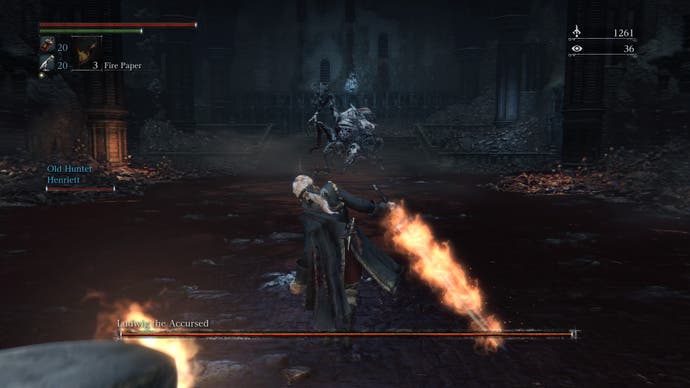
I'm being more vague about the specifics post-Ludwig, because The Old Hunters is something any Bloodborne fan should experience fresh. Part of the pleasure of this expansion, if you love the original, is finding out how the developers upend certain expectations, and what their imaginations can twist out of a concept as simple as 'fishing village.'
This is the final main area in The Old Hunters and, suffice to say, teasing out the atmosphere and texture of dead marine life leads to some especially horrific sights. Throughout this expansion previously-existing assets are used sparingly, whether environment work or enemies, and this is one of the reasons it feels so substantial - the large quantity of new work is bulked-out with some familiar silhouettes.
Where for a lesser developer this might dilute the impact of the new, Bloodborne's approach is ingenious. The Research Hall re-uses many of the assets from the Nightmare Frontier's Lecture Hall & Byrgenworth's interior - but the latter pair are tiny areas in Bloodborne that most players visit once. Here the concept they suggest is expanded, with books and surgical fittings spread luxuriantly over several floors, while tactile pleasures like the clattering pill and ointment bottles are given a devilish streak through their use in traps.
This in turn sheds new light on what the original spaces were - some echo of this more grandiloquent, festering whole. And so the cycle goes. With Ludwig, his heroism was already implied in the fact his name survives in Bloodborne's world - along with the dark knowledge that the greatest of hunters become the greatest of beasts. So to see him given such tumorous, brute form, his once-beautiful face distended across some polyp-like growth, is to see the original game deliver. Ludwig is a beast but his fate is tragic, and the soundtrack's full-throated echo of Sif's theme drives the point home across parallel dimensions.
The Old Hunters is the only DLC Bloodborne is likely to get, and the decision to combine two releases into this one was a great call, because this is the kind of depth and richness you dream of in an expansion. The locations and, especially, the boss fights here maintain Bloodborne's incredibly high standards, and manage that magical trick of somehow enhancing the original world at the same time. The best pieces of DLC I have played are Artorias of the Abyss and, now, The Old Hunters - From Software's approach to additional content is a lesson to every other developer out there. This may be the end for Bloodborne. But what a game, and what a way to go.
If you've come unstuck in the DLC, our Bloodborne: The Old Hunters guide is live now.
